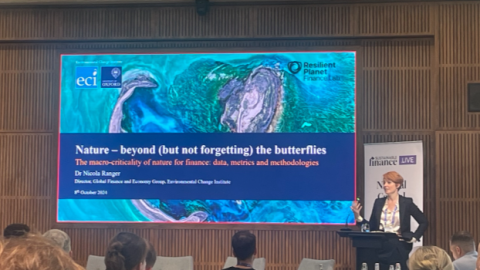Dr. Nicola Ranger, the director of the Global Finance and Economy Group at the Environmental Change Institute, University of Oxford, recently delivered a keynote address on her initiatives within the institute. Following her presentation, she participated in a Q&A session moderated by Richard Peers, focusing on the topic, “What’s Missing from the Transaction Journey?” In her talk, Dr. Ranger emphasized the financial implications of nature-related risks and discussed how the Green Finance Institute (GFI) is developing methodologies to evaluate these risks.
She highlighted that nature constitutes a significant financial risk that companies must acknowledge, noting that approximately 25% of species are currently at risk of extinction, a trend that poses critical challenges for businesses and their supply chains. The Intergovernmental Science-Policy Platform on Biodiversity and Ecosystem Services (IPBES) reports a concerning decline in 14 of the 18 essential ecosystem services, underscoring an urgent need for action regarding our planet’s health.
Reflecting on her two decades of experience as a climate scientist, Dr. Ranger acknowledged an alarming acceleration in temperature changes, stating, “In 2023, the scientific community was deeply concerned over unprecedented temperature increases.” She stressed the interconnectedness of nature and climate risks, explaining that these risks can propagate throughout supply chains and that a comprehensive approach to risk assessment must consider both elements holistically.
Addressing the primary sources of nature-related risk, Dr. Ranger pointed to the decline of pollinators, deteriorating soil quality, and water-related challenges. She concluded her keynote by reinforcing that while transition risks are substantial, they also create significant investment opportunities, particularly in areas concerning biodiversity, carbon, and water.
The following panel session, titled “How Can Financial Institutions Build on GFI’s Proposals to Enhance and Sustain Natural Capital in Customer Transactions?” featured industry leaders including Rachael Barza, associate director at EBRD; Tim Coates, managing director at Evenlode Landscape Recovery; Andrew Creak, founder of Kana Earth; David Croft, global head of sustainability at Reckitt; and Robert Gardner, founder of ReBalance Earth. The discussion revolved around enhancing customer experiences in transactions involving natural value, emphasizing transparency and accountability in ESG and impact investing initiatives.
Coates highlighted the necessity for a transformation in the global economy, cautioning that this transition will be complex and protracted. He stated, “The market is currently not ‘investment-ready,’ due to inadequate infrastructure, policy challenges, and capital misallocation.” By improving risk management, he argued, better risk-reward assessments could be achieved.
Gardner discussed how ReBalance Earth is attracting capital, noting a marked shift in pension funds toward impact investing. He pointed out the urgency of addressing immediate challenges such as flooding, stating, “By targeting these urgent needs, we’re effectively raising capital and driving impactful solutions.”
Barza elaborated on an EBRD initiative to repurpose a river in Moldova, integrating climate resilience, flood mitigation, and biodiversity enhancements. She acknowledged the difficulties in establishing a market for nature investments but noted promising mainstream acceptance of biodiversity projects among clients.
Croft underscored the immaturity of the market and the need for cooperative efforts between market and non-market players to optimize risk and resilience investments. He stressed that effective public-private partnerships could yield substantial benefits for nature and carbon-related solutions.
Creak called for more asset managers to engage in advancing nature-related projects, pointing out a talent shortage in the field. He remarked, “There are numerous professionals in traditional asset management sectors, yet only a handful who can lead funds focused on natural capital. This represents a valuable career opportunity.”
Gardner further argued for amplifying the focus on nature-related risks within investment discussions, highlighting that losses attributable to nature degradation could significantly impact global GDP. He expressed a desire for a more integrated approach, where nature-related metrics are discussed alongside conventional economic indicators like interest rates and inflation, to convey their substantial economic significance.
